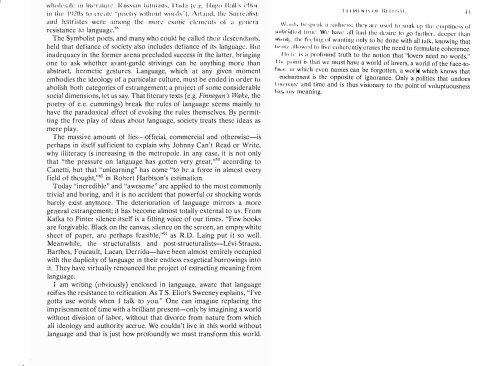CONTENTS - ouroboros ponderosa
CONTENTS - ouroboros ponderosa
CONTENTS - ouroboros ponderosa
Create successful ePaper yourself
Turn your PDF publications into a flip-book with our unique Google optimized e-Paper software.
, "<br />
whpil's;iI,' III lilt-LlllIl C. "lIssi;1I1 I"UIIiI isis. 1);,,(;, l Co,',. II II!'." I ttll ' s d'I",<br />
ill Ihe " )2!!, 10 l"l'c;ile "poeily wilhoul "'(1"ls"), A,lau", Ihe SlIrrealisl:<br />
and ktlrits wa among the mme exotic c"'JIIellls or a ',eJJ('fa<br />
resistance to language."<br />
The Symbolist poets, and many who could he called their descendanls,<br />
held that defiance of society also includes defiance of its language. Bul<br />
inadequacy in the former arena precluded success in the latter, bringing<br />
one to ask whether avant-garde strivings can be anything more than<br />
abstract, hermetic gestures. Language, which at any given moment<br />
emhodies the ideology of a particular culture, must be ended in order to<br />
abolish both categories of estrangement; a project of some considerable<br />
social dimensions, let us say. That literary texts (e.g. Finnegan's Wake, the<br />
poetry of e.e. cummings) break the rules of language seems mainly to<br />
have the paradoxical effect of evoking the rules themsclves. By permit<br />
ti ng the free play of ideas about language, society treats these ideas as<br />
mere play.<br />
The massive amount of lies-official, commercial and otherwise-is<br />
perhaps in itelf sufficient to explain why Johnny Can't Read or Write,<br />
why illiteracy is increasing in the metropole. In any case, it is not only<br />
that "the pressure on language has gotten very great,"'9 according to<br />
Canetti, but that "unlearning" has come "to be a force in almost every<br />
field of thought,"" in Rohert Harbison's estimation.<br />
Today "incredible" and "awesome" are applied to the most commonly<br />
trivial and boring, ami it is no accident that powerful or shocking words<br />
barely exist anymore. The deterioration of language mirrors a more<br />
general estrangement; it has become almost totally external to us. From<br />
Kalka to Pinter silence itself is a fitting voice of our times. "Few hooks<br />
are forgivable. Black on the canvas, silence on the screen, an empty white<br />
sheet of paper, arc perhaps fe asible,"6' as R.D. Laing put it so welL<br />
Meanwhile, the structuralists and post-structuralists-Levi-Strauss,<br />
Barthes, Foucau lt, Lacan, Derrida-have been almost entirely occupied<br />
with the duplicity of language in their endless exegetical burrowings into<br />
it. They have virtually rcnounced the project of extracting meaning from<br />
language.<br />
I am writing (obvioliSly) enclosed in language, aware that language<br />
reifies the resistance to reification. As T.S. Eliot's Sweeney explains, "I've<br />
gotta use words when I talk to you." One can imagine replacing the<br />
imprisonment of time with a brilliant present-only by imagining a world<br />
without division of labor, without that divorce from nature from which<br />
all ideology and authority accrue. We couldn't live in this world without<br />
language and that is just how profoundly we must transform this world.<br />
1·'II\.lI·N I\ III 11'I'l l,\r I \<br />
\V,:td" IW'-.p(";Ji, ;t s;\(IIll'ss: Ihey an: lIsed to soak up !Ill' elllptiness or<br />
unbfl.d leKl 1J11H". We havl'






